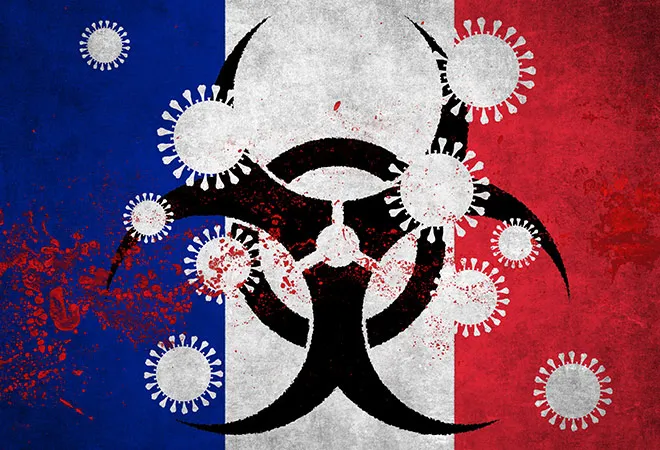
In France, the COVID-19 pandemic erupted as one more shock, in a series of social and political disruptions, such as the Yellow Vest movement
<1> and the protests against the government’s pr0posed pension reform. The French public was in doubt over President Emmanuel Macron’s agenda of bold reforms proposed during his 2017 electoral campaign. Will the Great Disruption created by the pandemic be a factor of change or push the country in a state of paralysis and distrust that could threaten its unity and its place in Europe? Six months after COVID-19 was declared a pandemic, its effect on the country is still unclear. The government, businesses and civil society must give up hopes of resuming ‘normal life’ and understand there is no turning back on some key transformations initiated during the pandemic. The question remains, will France embrace change, or will it continue to resist?
Big State or Big Society?
In a country where political distrust has been high for decades, the COVID-19 crisis has been more than just another opportunity for citizens to criticise the government. It has been a moment of collective disarray as the country was caught off guard for having believed too long it had the best healthcare system in the world. France is often tempted to compare itself with Germany, but it had to suffer a striking contrast with a neighbour that seemed to enjoy more strength and more agility thanks to a close collaboration with industrial giants and a flexible federal system.
It is precisely the inability of the government to collaborate with other partners (local actors, the private sector, NGOs) that has prompted most criticism and a new awareness of the necessity for the State to change its way of governing to be more inclusive. Macron stressed this change himself, by appointing a new prime minister. As a former mayor of a small town in Southern France, Jean Castex has promised more collaboration, more local autonomy and less top-down policymaking.
<2> As the COVID-19 crisis is far from over and requires a broad collective effort from actors at every level, this could be a historic opportunity to redefine the role of the State, and establish a new relationship between the public sector and civil society. Will the crisis be the opportunity to develop a new agenda of Big Society, as was attempted by former Prime Minister David Cameron in the UK in 2010?
On the other hand, the crisis has given new strength to the nostalgia for a Gaullist state, able to provide security and prosperity. The disruptions in the supply chain of critical goods to fight the pandemic, chemical agents for testing and the use of facemasks have been a struggle for a country that was not aware of these weaknesses. All political parties are now competing to be the champions of new industrial sovereignty that would protect the country against such vulnerability. Will the crisis be an opportunity to now give responsibilities to the civil society and the local communities, or will it prompt a willingness to reassert the centralised and top-down French State as it once was? These will be the key questions in the years to come and for the next presidential election, scheduled to take place in 2022.
Digitisation: Forwards or backwards?
Another key feature of the COVID-19 crisis in France has been a new awareness of the digital divide, both within the country and with its competitors. Even as digital tools are instrumental in the way many East Asian countries controlled the pandemic,
<3> French officials mainly used pencil and paper, and the attempt to set up a functioning tracing app (StopCovid) was far from convincing. So far, less than three million users have downloaded the app, which is not enough to make it efficient. In the meantime, the digitisation of the private sector and parts of the public sector, have been a lifeline for the French economy during and after the lockdown, leaving many to wonder how such a crisis would have been overcome a few decades earlier.
As such, the pandemic has been a call for action to accelerate the digitalisation of key sectors of the country. The healthcare system, which fought the virus with very few digital tools, will be awarded €2 billion in a huge investment plan over the next three years,
<4> in a move that could prompt a much-awaited e-health revolution in France. The closing of schools and the lack of tools for remote teaching have also exposed the urgency to build a more agile and digital school system in a country struggling with an overly centralised education ministry and a reluctance to develop new education styles and tools. A national conference on digital education is scheduled for November and could accelerate that trend. In July, the government reshuffle led to the appointment of a new minister in charge of the transformation and the digitisation of the whole public sector, with the mandate to reach concrete and visible results before the next presidential election.
Is this the advent of a fundamental cultural change, starting with the working culture? France has been characterised by an emphasis on hierarchy and control in the workplace, and a reluctance to allow more flexibility, including remote working through digital tools. The pandemic crises fostered huge change, with almost 30 percent of employees working from home during the lockdown. This figure is now back to 15 percent,
<5> even though the government is urging businesses to keep their employees from taking the public transportation system and allow them to work from home whenever possible. Before the summer, many companies tried to go back to normal and required employees to show up to the workplace. In the meantime, a large part of the workforce is keen to keep a more digital and flexible way of collaboration. The issue of trust, particularly crucial for the political system, is also a key element for the future of businesses, and the opportunity to transition from a hierarchical to more horizontal team management in the working place.
Even as digitisation appears more important than ever, it is also facing distrust from a growing part of the country. As the Yellow Vest movement revealed, a large part of the lower middle class feels increasingly threatened by the digitisation of the economy, and the pandemic enhanced the level of resistance, using legitimate concern over privacy to raise doubts on every new government initiative in that regard. The development of an effective e-health platform will probably face such reluctance, just as the tracing app did. How the country will be able to move forward with the next digital revolutions, including AI, will be key to its economic and political competitiveness, in Europe and elsewhere, and the long term effects of the virus are, again, still unknown.
France in Europe: Triumph or isolation?
The pandemic is also changing the relationship between France and the European Union (EU), a key element for a country that seems less passionate about the European project over the years, even though it elected a president with a passionately pro-Europe platform. In that regard, the response to the COVID-19 crisis has led to Macron’s most significant victory on the European stage—the decision to launch a huge recovery plan at the European level based on joint borrowing by all EU member states, an unprecedented step toward a more integrated EU, long-awaited by Macron since his vibrant speech at La Sorbonne in September 2017. The writer of the speech, Clément Beaune, Macron’s longtime adviser for European affairs, has just been appointed a junior minister, and can at last take credit for the patient diplomatic work behind the scene. This European loan will pay almost half of the huge stimulus package that has been announced by the French government. More importantly, Macron and German Chancellor Angela Merkel have worked closely to achieve this deal, in a coordinated approach that would have seemed impossible before the outbreak of the pandemic.
If this new political romance is to last, it could mean a huge boost for the European project and the competitiveness of the continent at one condition—that the pandemic does not further weaken the Eurozone’s most vulnerable economies, Italy, Spain and France included. The economic shock on the French economy has been such that it now appears as a member of the club of Southern countries with a huge amount of debt and a big question mark over its ability to withstand competition from Northern countries, especially Germany.
For all these reasons, the success of the much-awaited recovery plan, officially announced by the French government on 3 September, will be key. These €100 billion will be more than an injection of cash in the economic engine. It will be the opportunity to accelerate the ecological transition (with investments up to €30 billion), the training of the workforce (another €30 billion) and the digitalisation of the economy. But this plan should also be an opportunity to demonstrate the ability of the government to deliver quick and concrete results in close cooperation with local authorities and with the help of new digital tools to monitor the progress and the results of these huge investments.
In a way, the still-unfolding pandemic crisis is a moment of truth for the ability of the Macron presidency to deliver on its promises—reforming the public sector to be more agile, accelerating digitalisation at all levels and revitalising the European project in the eyes of the French public. But each of these transformations is fragile and could lead to a backlash. The success of the French recovery plan and the ability to stabilise the level of the virus spread in the country will be two key elements in this complex economic and political equation.
This essay originally appeared in Rebooting the World
<1>“The Yellow Vest protesters: the tip of the French social crisis?,”
Institut Montaigne, 28 March 2019. https://www.institutmontaigne.org/en/blog/yellow-vest-protesters-tip-french-social-crisis
<2> Jean Castex, “General Policy Statement to the National Assembly” (speech, Paris, July 15, 2020),
https://www.gouvernement.fr/partage/11654-declaration-de-politique-generale-de-m-jean-castex-premier-ministre-assemblee-nationale
<3> Mathieu Duchâtel, François Godement, Viviana Zhu, “Fighting COVID-19: an East Asian Response to the Pandemic,”
Policy Brief, Institut Montaigne, April 2020. https://www.institutmontaigne.org/en/publications/fighting-covid-19-east-asian-responses-pandemic
<4> Alice Vitard, “Ségur de la Santé : Le gouvernement injecte deux milliards d'euros pour le développement de l’e-santé,”
L’Usine Nouvelle, July 22, 2020,
https://www.usine-digitale.fr/article/segur-de-la-sante-le-gouvernement-injecte-deux-milliards-d-euros-pour-le-developpement-de-l-e-sante.N987994
<5> Solveig Godeluck, “Le télétravail a beaucoup reculé malgré la persistance du coronavirus,”
Les Echos, August 26, 2020,
https://www.lesechos.fr/economie-france/social/exclusif-le-teletravail-a-beaucoup-recule-malgre-la-persistance-du-coronavirus-1236737
The views expressed above belong to the author(s). ORF research and analyses now available on Telegram! Click here to access our curated content — blogs, longforms and interviews.



 In France, the COVID-19 pandemic erupted as one more shock, in a series of social and political disruptions, such as the Yellow Vest movement
In France, the COVID-19 pandemic erupted as one more shock, in a series of social and political disruptions, such as the Yellow Vest movement PREV
PREV


